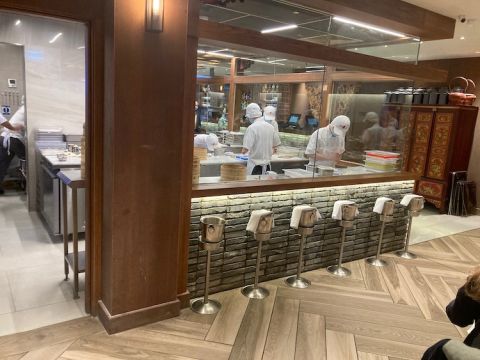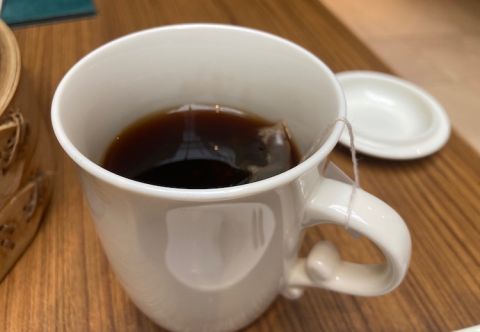Like so many others around the world, I have long been a fan of Din Tai Fung.
I first ate at one of their now over 150 branches worldwide in Shanghai in 2015 and I was blown away. First of all, by the size and scope of all that their chefs produce. They were then producing over 2.3 million examples a month of their delicious pork and crab xiao long baos, steamed dumplings filled with a touch of soup that makes them slightly tricky to swallow – a number that must have increased as their continuous expansion has rolled along. And then by the quality of what they were turning out. Their dumplings were fantastic: light and filled with just the right amount of meat and delicious soup. And they were, amazingly, all served piping hot.
Originally, they began on a very small scale in Taiwan but today, via a franchising method, there are branches in Australia, China, Hong Kong, Indonesia, Japan, Macau, Malaysia, the Philippines, Singapore, South Korea, Thailand, the United Arab Emirates, the United States and, last but not least, here in the United Kingdom.
I even harboured illusions about being involved in Din Tai Fung’s presence in London. When I was still involved as a consultant to Argent, the developers of the King’s Cross estate, I would mention approaching them to see whether they would be interested in taking a space at virtually every meeting I attended. In the end, they settled on the far more conventional locale of Covent Garden with its appeal to shoppers, office workers, opera goers and tourists alike.
And now, having eaten there – admittedly only once – I am glad that I was not involved. The food and even the tea at Din Tai Fung, London, were not a patch on what I ate and drank in Shanghai and my overall experience was, frankly, dismal.
It is as though everything the management has imbued their staff with is superficial. And what they have omitted has everything to do with the flavours emanating from the kitchen, pictured below.
At 12.05 I was greeted extremely politely by a young, masked, female receptionist outside the front door on Henrietta Street. She handed me over to an equally polite assistant manager who led me past the glassed-in production kitchen. This is their showcase and here 12 to 15 men and women, dressed from head to toe in whites, were actively involved in the production of their famous xiao long baos. We walked past them and I was shown to a table with Karim as my waiter. So far, so impressive.
On the table was this small counter with the menu on a QR code. Karim promptly asked me whether I would prefer to read their written menu or use my iPhone. Being an old-fashioned kind of a guy, I asked for their written menu. Which led to my first disappointment.
What arrived was a menu from the Chinatown of the 1980s. The quality of the photos of each dish was not exciting at all, the colours were too glaring and off-putting, and the overall effect was dismal. The management also seemed to have a habit of sticking a Not Available sign under far too many dishes.
Then came the second shock, perhaps the biggest of them all. China, as everybody knows, created the custom of drinking tea and I happen to be a big fan of pu-erh tea, the aged and fermented tea from Yunnan province, which was priced here at a very reasonable £3 and which I happen to really enjoy at lunchtime.
I was not expecting any kind of tea ceremony but I was expecting a pot with some freshly brewed pu-erh tea leaves in it and a clean cup or even a mug to drink it from. But what I was served would have graced any Parisian bistro. Out came a white mug, with a handle, with a pu-erh tea bag in it, filled with hot water and topped with a lid. That was it apart from the offer of some extra hot water to top the tea bag up once I had drunk it, thereby depriving me of the delightful habit of turning the top of the pot over when a refill was needed, as is the custom in so many Chinese restaurants.
Then it was on to the food. Of course I had to order some xiao long baos, fortunately offered in servings of five or 10 so I ordered one of the former (£8.50) along with a portion of string beans topped with a shrimp sauce (£5.50) that I thought would provide contrasting crunch and piquancy. The beans, nicely trimmed, certainly provided the crunch but that was all: the topping of shrimp sauce lacked any spice, or anything extra by way of heat. The xiao long baos were leathery; their soup content was negligible; and, worst of all, they were served less than piping hot. They were a huge disappointment.
Still hungry, I asked for the menu and ordered a dish of chili pork and vegetable wontons (£8.50) which were, despite the enthusiasm of my waiter, also disappointing as they were also served tepid. I paid my bill of £28.89 and left.
Investigating further, I found this reference to the partnership behind Din Tai Fung in London in Singapore’s Business Times from late 2018.
‘Din Tai Fung’s maiden foray into Europe is spearheaded by Taster Food UK Limited, an indirect wholly-owned subsidiary of Singapore-based BreadTalk Group. Taster Food’s fully-owned subsidiary Together Inc (50.5%) is in a joint venture with Din Tai Fung Restaurant Co (15%), Fairy Rise Development (15%), Stour Crema (7.5%), UK partner Tristan Hoare (7.5%) and Taiwanese partner Song Yih (4.5%).’
This was accompanied by a photo of seven men, six of them in suits and ties, including intriguingly PM Boris Johnson and Ben Elliot, his chief fundraiser.
Based on the rumour that Din Tai Fung are set to open a second London restaurant in Centre Point on the north-east corner of Soho and a third in Selfridges Food Hall quite soon, I can only assume that their management is intent on revenue, growth and profitability rather than adhering to the overriding principle of quality. There was too little of this last on show at their initial branch in Covent Garden.
Din Tai Fung 5–6 Henrietta Street, London WC2E 8PS; tel: +44 (0)20 3034 3888
















